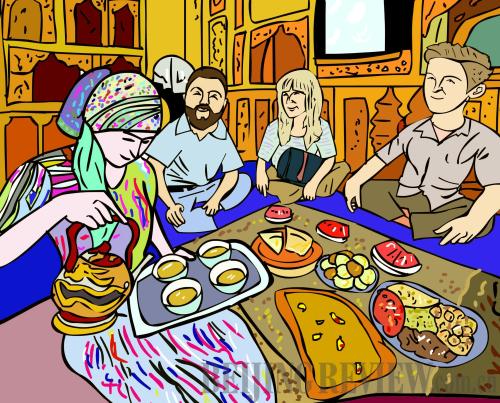|
 |
|
(LI SHIGONG) |
We are beginning our trip on the Silk Road near Urumqi, northwest China's Xinjiang Uygur Autonomous Region. If you picture the map of China, you will see a rooster with the beak. We are touring the rooster's tail area.
Our Uygur guide Kalim, says, "Today we'll visit a Kazak yurt if we can find one."
There are no yurts—round-like and portable dwellings—in sight here, just small stucco houses. We learn that when Kazaks travel, they follow their sheep. "They were here," Kalim complains.
Now we find a Kazak house (not a yurt) where a woman says we are welcome to visit. We step respectfully inside the primitive kitchen. The walls are covered with handmade rugs.
"So that is how they stay warm here," I say. I notice a colorful butterfly pattern on the neatly stacked bedding; pillows are trimmed in pink, gold and red; dried fruits and nuts await us, as our hostess serves us hot tea in cracked white crockery. Outside in the courtyard, we take photos of chickens, a leather bucket and the outhouse.
As the impressive new highway takes us deeper into the wilderness, we spy occasional yurts. An earnest young man approaches as we get off the bus. "Do you want to try my horse?" he asked.
I photograph his rainbow-colored saddle blanket made of hand-loomed fabric. The saddle has a padded horn. I already know the Chinese horses are descended from shorter Mongolian horses, so I know I could climb up easily. "Keyi (I can)," I say.
I gently pet both velvet ears of this docile horse saying, "Good boy." The guide smiles. "Oh! no English," I say. "Haode (OK)," I correct myself in Mandarin. One of my companions jokes, "I knew she'd be the one to take a ride!" As the guide leads me up a grassy trail, I drink in the solitude. I am restored by the cawing of a bird. Is it a kingfisher? Others join us. We walk slowly beside a mountain stream through a grove of poplars.
My guide wears an Adidas jacket and blue jeans with distinctive Chinese top stitching. He is sunburned.
"What's your name," I ask in Mandarin, "and what's your horse's name?"
To address his surprise I add, "I studied Mandarin in college." Although Kazaks have their own language, the guide also speaks Mandarin. I am thrilled to practice the language, "I am Barbara."
"My name is Bi Lingling. My horse has no name."
"Why? You must have a name for him."
"We call him Brown."
"At the bus you spoke English," I say. "Where did you learn? Are you a student?"
"I'm a university student in Urumqi. I graduate in two months."
"What do you study?"
"I am a doctor."
I have misjudged the situation. I thought he was a poor villager whose job is to sell rides.
My friend calls to me, "Barbara, when I was a kid, I owned a horse in Columbia. I wish my girl would let go of the reins!" I translate. Bi directs the girl. Terese confidently gallops up a grassy hill. What a sight. Moments ago, we were tourists on a cramped bus. Later, on the bus I ask, "Did the Kazak horse handle as well as other horses you have ridden?" "Perfectly! He was so easy to ride!" she says. "Impressive."
My pony's smooth gait, combined with the fluttering yellow leaves, and the sounds of the stream makes me want to write a poem and paint this scene.
"What a gorgeous old tree." I say to the young doctor, "I'm a retired teacher. Now I have time to paint a Chinese landscape. I want to paint that tree. How old is it?"
"More than 300 years old. A silver poplar," says my guide.
"Are there Kazaks in San Francisco?" he asked?
"I've never met any," I confess. "I'm sure we have Kazaks. People from many countries live there. I had 17 cultures in my English classes," I say. "We'd better go back." I loathe leaving this paradise. I stroke the ears of the pony one last time.
"Go to university in the United States in the future," I whisper.
Bi grins, leaps gracefully onto his horse, and races high-speed. He waves.
Ten village kids on horseback encircle me. I say, "It is so beautiful here! The view is fantastic. The sky is blue. I'm from California. I love your horses. I like Chinese art and calligraphy. I'm a teacher. Thank you!" Kids with smudged faces and messy braids giggle. As I get out my movie camera, they yank their reins, scattering like dried leaves in a Chinese wind.
The author is an American who has visited China | 